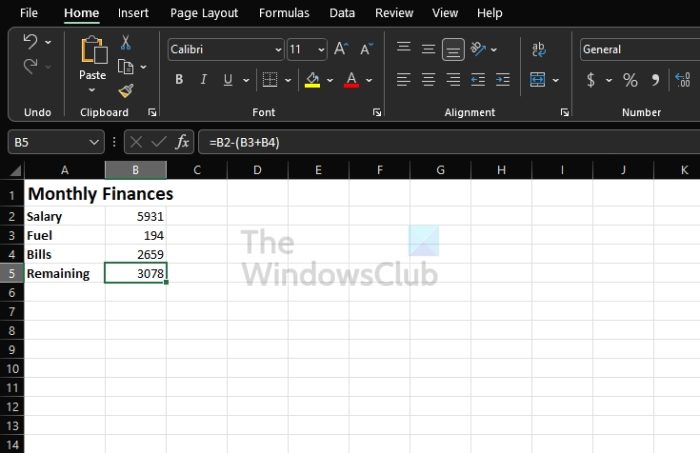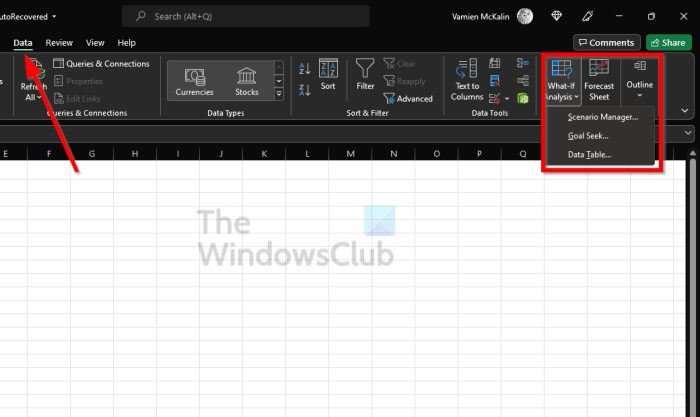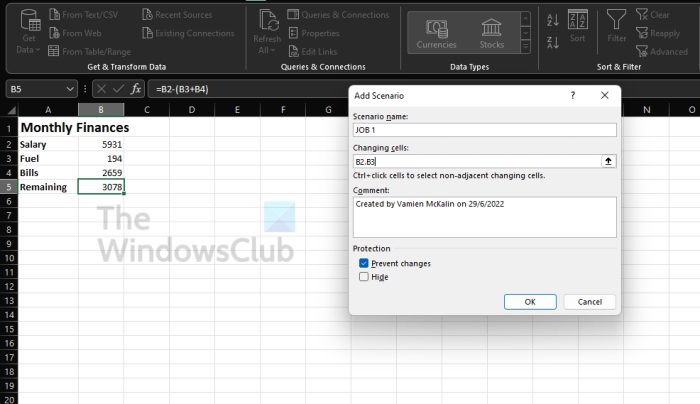Microsoft Excel has a feature that is called Scenario Manager, and from our understanding, most folks have no idea how to use it or what it is. But that’s fine because this article will explain how to take advantage of the Scenario Manager to make better decisions.
What is Scenario Manager in Excel?
The Scenario Manager feature in Microsoft Excel is designed to allow users to change or substitute input values for several cells at the same time. For example, it is possible to look at the results of different input values or scenarios all at the same time. You can use the Scenario Manager in Microsoft Excel to compare data side by side and also swap multiple sets of data within a worksheet
How to use Scenario Manager in Excel
You’ll find that the Scenario Manager is easier to use, but you must ensure the relevant data has already been added to the spreadsheet before moving forward. That is not something we can help you with. This means, that this article is written with the belief that you already have some form of experience with Microsoft Excel.
Here we are going to look at two jobs and which one of them pays best at the end of the month based on certain circumstances. First, you must add one of the scenario data to the spreadsheet before we can begin.

If you are practicing, you can follow what is seen in the image above. Please use the following formula to calculate the money remaining:
=B2-(B3+B4)
Change the formula according to the placement of the data on your spreadsheet. Don’t just use it as is for every situation.
- Navigate to the Scenario Manager Window
- Populate the Scenario Manager with data
- Create a new Scenario Manager
1] Navigate to the Scenario Manager window

- From within the document, click on the Data tab.
- Next, you will want to select What-If Analysis.
- From the dropdown menu, please click on Scenario Manager.
- The window known as Scenario Manager should now appear.
2] Populate the Scenario Manager with data

- From within the window, please click the Add button to add a scenario.
- From the Scenario Name section, type Job 1.
- When it comes down to Changing Cells, this is where you’ll enter the cell references for all the cells you plan to change for the scenario.
- Add a comment if needed.
- If you want protection, then tick the box next to Prevent Changes.
- Hit the OK button.
A pop-up box should now appear. Ensure the values are in the corresponding boxes. Finally, hit the OK button.
3] Create a new Scenario Manager
- Once you’ve clicked the OK button, it is time to get a new Scenario Manager up and running for Job 2.
- Press the Add button.
- Add the information for Job 2 similar to what you’ve done for Job 1 via the Scenario Manager window.
- Time to enter the values for the second scenario. But bear in mind you must not add these values to the sheet.
- After completion, hit the OK button.
To view data on each Job, select one from the list via the Scenario Manager window, then select Show.
Read: How to calculate CAGR or Compound Annual Growth Rate in Excel
Why is the Excel Scenario Manager useful?
If you want to compare data in a side-by-side fashion, then we suggest using the Scenario Manager feature in Excel. You can also use it to swap multiple sets of data within a single worksheet. So in essence, if you have multiple variables and you are interested in seeing their effect on the final result, and if you want to estimate between multiple budgets, then fire up the Scenario Manager.
How do I access Scenario Manager in Excel?
Accessing the Scenario Manager section is super easy, more so than you might have expected. To do this, you are required to click on the Data tab, then go to Tools, and from there, select What-If Analysis. Finally, click on Scenario Manager, and from that area, click on the Add button to get things moving in the right direction.